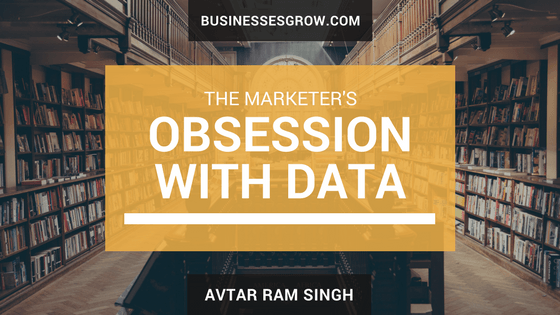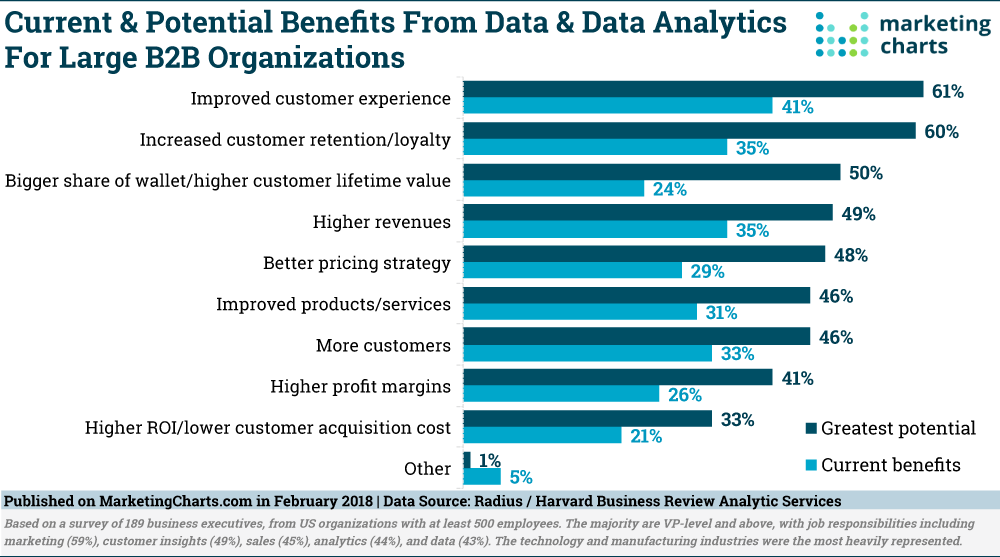
By Avtar Ram Singh, {grow} Contributing Columnist
As marketers, we’ve become obsessed with data. I wouldn’t be surprised if your reaction to that opening statement is, “Do you have data to back up that claim?”
In the last few months, I’ve found myself in situations where after making a fairly logical argument (in my mind), I’m asked whether or not the marketing data supports the assumption or argument that I’m making.
A few years ago, it didn’t bother me. Today, that question drives me nuts.
As marketers, we’ve become so obsessed with data and the promise of data that we’ve forgotten that data is meant to be a tool. Our data-driven decisions are only as good as the questions that we ask of it, and the tests that we run, which in turn generate that data.
Don’t get me wrong, the quest to measure everything should be championed. It is a proof point that a marketer is looking to be responsible, accountable, and impacting the growth of the business. At the same time, the ability to understand how to use data is what sets the good marketers apart from the great ones.
We’re not meant to be slaves to data, data is meant to work for us. We have come to a point where we need to mindfully balance data and emotion to succeed.
The value that marketers bring to the table
If business data were the answer to everything, we wouldn’t need seasoned marketing professionals driving the marketing division of a company. We’d get data analysts that understood how to read data, and pass instructions to a team on what to do with it.
At the end of the day, clicks, bounce rates, social engagement rates, conversion rates only tell us what consumers are doing with our marketing messages, but not why they’re doing it.
That’s an answer that a marketer must be able to provide. What is it about the message that is driving a response from a particular target audience? What did we try to do with this target audience, based on what insight, and why did it end up working?
And based on the response — the data that we’ve generated — what does that tell us about the implications of our tests and results, and how does that impact future marketing?
“Do more of what works” isn’t the answer.
Balancing data and emotion
Whenever a company or team tells me they’re “data-driven”, the very first question I ask them is, “Are you data-driven or are you data-informed?”
It often gives them pause.
Is data the decision maker for you, or are you using data to make better decisions by coupling what the data says along with common sense, logic and intuition?

A recent study conducted by Radius and the Harvard Business Review depicts that senior executives expect data to improve customer experience, enhance customer loyalty, and increase customer lifetime value. These are incredibly tough metrics to impact for marketers. In fact, these are potentially the biggest pain points in growth for most organizations, and cracking the code is a sure way to establish yourself as a brilliant marketer.
The trouble is, the data will never tell you how to do this, it will only guide your judgement by telling you what changes in customer experience are working, which ones aren’t, what tweaks in your marketing is potentially increasing loyalty, which aren’t … and so on.
The data will never make decisions for you, so stop hoping that it will. That’s your responsibility.
Data at the expense of creativity
Sometimes, brands end up doing things that have never been done before.
That’s where the magic happens.
For example, the absolutely fantastic Tide Super Bowl ad. Tide was setting out to do something that had never been done before. How will data ever be able to guide that project?
If P&G had taken the approach of being data-driven, the pitch for the Tide ad would have been chucked because “the data doesn’t support that it will do well” – purely because the data would have looked at pre-existing Super Bowl ads and tried to find a pattern of what works best within them.
When we’re focusing too much on the data, we’re bound to play it safe. We’re bound to optimize based on what’s worked in the past, fine tune it, and create a better version of it.
That’s boring, and consumers don’t want to see something that’s fine tuned. They want something inspiring, something fresh, and something that sets you apart from the crowd.
Re-capturing emotion
Some of the best marketing works purely on emotion. It’s not always something that pulls at your heart strings. It could be inspirational, emboldening, hilarious, relatable, or simply logical.
My favorite ideas have been based on brainstorms that spark a thought within one person, which is bounced off another person, and another, padded with an anecdote, coupled with an observation, and finally an idea that seems to be the right answer sees the light of day.
We know it in our gut. It feels right.
And data hasn’t found a way to measure what feels right just as yet. I doubt it ever will.
Until that day comes, marketers must remember — data is a tool that we use. It’s often flawed. It’s only as good as the questions we ask of it, and the way in which we use it. It’s not meant to replace us, nor is it here to make our decisions for us.
It’s here to work for you, so put it to work for you. But never let it be in control.
 Avtar Ram Singh is the Head of Strategy at FALCON Agency, a performance-led, business results oriented marketing agency that operates in South East Asia. He’s built marketing strategies and performance frameworks for brands on global and regional levels, across a variety of industries. You can find him on LinkedIn, and Twitter.
Avtar Ram Singh is the Head of Strategy at FALCON Agency, a performance-led, business results oriented marketing agency that operates in South East Asia. He’s built marketing strategies and performance frameworks for brands on global and regional levels, across a variety of industries. You can find him on LinkedIn, and Twitter.


